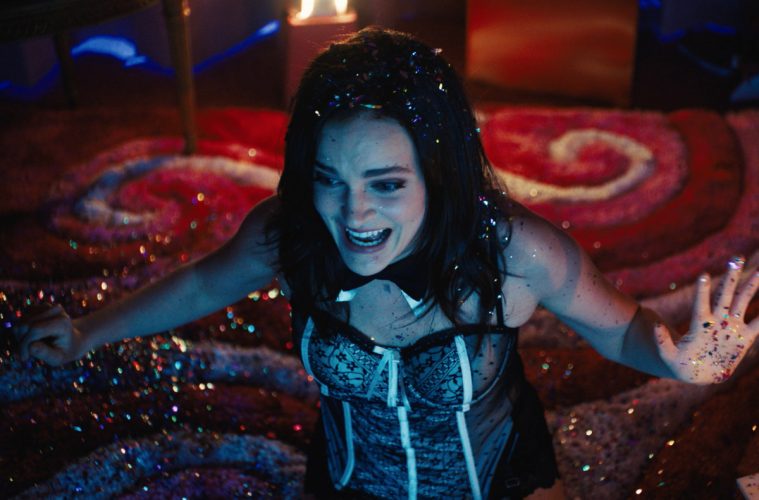While representation of marginalized groups in media continues to be loudly advocated for, sex workers have been notably left out of the conversation. As their depictions typically involve them being objectified, getting killed off, or waiting to be rescued, Isa Mazzei and Daniel Goldhaber’s Cam arrives to tell viewers, “no more.” Against an identity thriller backdrop, their gripping debut not only abandons negative tropes completely, but naturally enables the audience to empathize and root for an adult performer. 2018 has been incredible for horror, but Cam is easily one of the year’s best and most groundbreaking entries into the genre.
Cam is a window into the life of cam girl Alice Ackerman (an unforgettable Madeline Brewer), who is determined to boost her online rank through her virtual identity, Lola. During a live broadcast on FreeGirls.Live (a functioning website created just for the film), she exudes genuine ambition. Gorgeous, neon pink lights illuminate the room, complementing its cozy yet glamorous interior. Comfortable and enlivened whenever the webcam aims toward her, Alice has designed an oasis where her dream of being a camgirl can be attained. As with any job, however, there are inevitable difficulties. For Alice, there’s trying to keep her FGL followers away from her private life, as well as keeping her cam life concealed from her mother (at least until she breaks the top ten). With Mazzei being a former camgirl herself, the film delivers essential authenticity that never once glamorizes or romanticizes sex work. From Alice’s unique broadcasting room to keeping track of her shows on a calendar, Cam captures the intricacy of camming as a culture, livelihood, and avenue of fulfillment. While experiencing this gratification, however, Alice faces the dangers of the digital world when a mysterious doppelgänger takes over her account.
Lola’s replica has the bubbly, engaging confidence that the real Lola does, except she’s much more reckless. It’s especially disturbing that as dedicated as her fans are, they can’t even tell the difference. The cam site’s tech support is useless, as are the police, who are more interested in what “weird” things Alice has done on camera than they are in investigating her crisis. This encounter may be familiar for many sex workers, as their work isn’t just merely disregarded by law enforcement, but often completely unprotected. Alice’s dark, living nightmare turns into a void where no one can be relied on but herself.
Cam meditates on the anxieties that come with losing control of one’s life. Relentless unease, amplified fear, everything becomes a threat. It’s chilling to behold Alice watching her clone in action, exhibiting nothing but vulnerability. The film taps into the notion that technology runs our lives, but drives it into more visceral, forward-thinking territory. Brewer’s raw performance adds intensity to the overall ride, urging the audience to absorb her every move. When Alice experiences confusion, pain and nervousness, we feel it too – and it cuts deep. Executing multiple roles that each contain their own assemblage of emotions, Brewer’s versatility will certainly make her an actress to continue watching out for.
Every element of Cam is lively, effective, and insightful. One of its most ethereal and immersive aspects, though, lies within the cinematography by Katelin Arizmendi. During tense moments, the camera’s movement is either frantic, or fluid and eerie. The film’s intelligent use of color contains more depth than it may appear to at first glance. With a neon aesthetic drenching the camming world ─ and never anywhere outside of it ─ Cam almost implies that without sexual liberation, everything else in life is mundane. Gavin Brivik’s original score brings waves of dreamy, electronic textures and hypnotic percussion and descends us further into Alice’s daze of terror.
Goldhaber and Mazzei have wonderfully crafted an experience that can open minds. Perhaps more of an ode to the validity of sex work than a techno-thriller, their ability to champion a misunderstood community will make audiences eager to witness what the duo does next (make sure to look out for Mazzei’s memoir, Camgirl, next year). The film’s ambiguities are beneficial and allow for its beautiful conclusion to thrive, doing justice not only to Alice as a character, but to everything she’s worked for. Whether it becomes a feminist cult classic or a trailblazer for uplifting, respectful depictions of adult entertainers, Cam deserves to be embedded in our memory.

